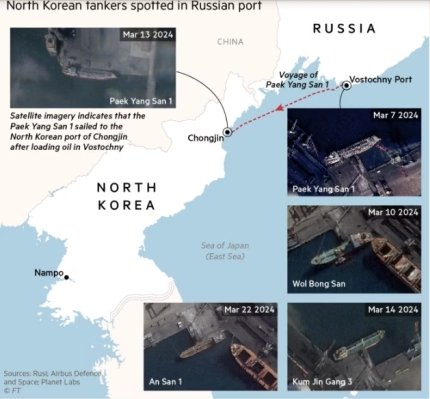The US and South Korea have formed a new task force aimed at preventing North Korea from buying illegal oil from Russia.
The U.S. and South Korea will block Russian oil in North Korea
The first meeting of the EDTF (Enhanced Disruption Task Force) group took place on March 26 in Washington.
More than 30 officials from ministries and departments responsible for diplomacy, intelligence, sanctions, and maritime traffic prohibition attended the meeting.
The South Korean Foreign Ministry noted that both sides expressed concern over Russia's supply of oil to North Korea and discussed ways to end illegal cooperation between Moscow and Pyongyang.
Oil is an important resource for North Korea's nuclear and missile development and military power, the statement said.
The U.S. State Department said a U.S.-South Korean task force is considering potential actions to disrupt North Korea's petroleum procurement networks. These include exposing sanctions evasion activities, imposing unilateral sanctions, and engaging the private sector and third parties across the region that knowingly or unwittingly contribute to the supply of oil.
What is known about the supply of Russian oil to North Korea
The sea shipments from Russia, which began on March 7, are the first documented since the U.N. Security Council — with Moscow's approval — imposed severe restrictions on oil supplies in 2017 in response to North Korea's nuclear weapons tests.
These oil shipments are a full-scale assault on the sanctions regime, which is now on the verge of collapse, said former UN coordinator of the group Hugh Griffiths.
All North Korean-flagged vessels, classified as oil tankers, were called at the same Russian oil company berth in the Eastern Port, where they loaded.
Satellite images confirmed that the two ships left the Eastern port for the North Korean port of Chongjin, where they likely unloaded.














